What is daikon and its beneficial properties

Among vegetables there are interesting options that you rarely see in the garden. There is a root vegetable called daikon. Not everyone knows about it, since it differs from the usual garden crops. What is daikon?
Content:
- What are the features of daikon?
- Beneficial properties of root vegetables
- Contraindications
- Growing root vegetables
- Use in cooking
What are the features of daikon?
In appearance, this root vegetable is similar to a huge radish or carrot. It grows up to 30 centimeters in length and up to 8 centimeters in diameter. If favorable growing conditions are provided, daikon can reach up to 60 centimeters, in which case its weight will be 0.5 kilograms.
The root vegetable is white in color and tastes very much like radish. But there is no bitterness in it, and the aroma is much more pleasant. In Japan, this vegetable is often used to prepare a variety of dishes. It is added to side dishes and salads. The root vegetable goes well with meat and fish dishes. Soups are prepared from it, which acquire a unique taste.
Beneficial properties of root vegetables
In addition to its interesting taste, daikon is full of beneficial properties. Among the components of the vegetable are vitamin C, and it is an excellent assistant in the fight against colds and has a positive effect on the immune system. If a person is looking for a product that can provide a daily dose of vitamin C, then daikon is worth choosing. To do this, it is enough to consume 300 grams of root vegetables per day.
Daikon contains vitamin B. It has a positive effect on the functionality of the nervous system, normalizes the state of mind, improves attention, calms, and removes anxiety. Potassium, which is also present in the root vegetable, strengthens teeth, hair, and bones.
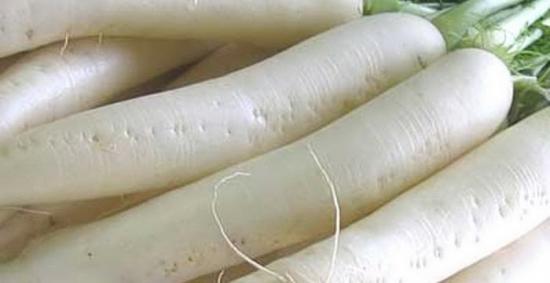
Daikon is able to normalize liver function. It affects the resorption of sand and stones that form in the kidneys. The composition contains isorodanoic acid, which is used to prevent neoplasms. With the help of fiber, the vegetable turns into an excellent dietary product. If you eat a small portion, you will feel full, which lasts about 4-5 hours.
The vegetable contains enzymes. They break down starch. But excessive amounts of it contribute to weight gain. Therefore, daikon is considered a dietary product. 100 grams of vegetables contain only 21 kcal. Phytoncides can destroy bacteria and create protection for humans from infection.
It is recommended to consume the vegetable raw; in this way, you can cleanse the body of excess cholesterol and toxins. Scientists have conducted research on daikon.
They found that systematic consumption of the vegetable improves the health of people who suffer from diabetes and vascular and heart diseases. This product is also used for external use. Compresses are made from it that help wounds heal, strengthen hair, and get rid of annoying freckles.
Contraindications
Despite the huge list of positive properties of daikon, there are some contraindications, which should be considered before consuming the vegetable. You should not eat the root vegetable if you have the following problems:
- Diseases of the stomach and intestines.This is due to the high fiber content in daikon. Overdoing it can lead to unpleasant consequences.
- Gastritis
- Ulcer
- Gout
- Severe disorders of the liver and kidneys
Knowing the benefits of the product, taking into account the contraindications, consuming daikon will improve your health. If a person decides to add this product to the nutrition menu, it is recommended to initially consult with a nutritionist.
Growing root vegetables
This is an unpretentious garden crop, but still it also needs some attention. It is recommended not to plant the plant in a place where cabbage was previously grown. To improve productivity, you should lean towards light soils. This is also influenced by how deep the groundwater is. The yield increases if the depth is deep enough.
Before planting, it is worth digging up the soil well in the autumn and spring. It is recommended to add a lot of humus. Experienced gardeners advise planting vegetables seeds. But to get an early harvest, you should initially grow seedlings. Mid-summer is ideal for planting. If you water the plant well, then the fruits will be juicy.
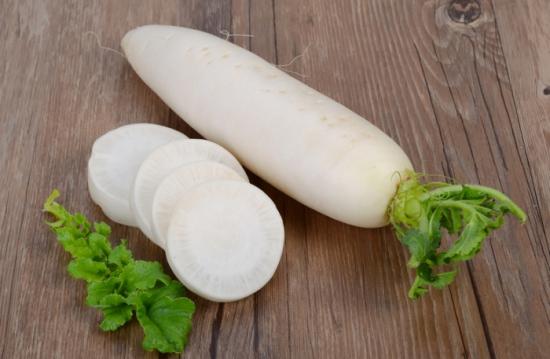
A lack of moisture will cause the daikon to grow tough. Where the temperature occasionally drops sufficiently in summer, root crops grow large. In some cases, gardeners grew giant vegetables.
Use in cooking
It is impossible to say what vegetable daikon tastes like. The most similar to it are radish and radish. But the most important difference is that this vegetable has no bitterness. This is a huge advantage, as it can be eaten raw and added to summer salads.
In this case, all beneficial properties are preserved as much as possible.But the root vegetable is consumed not only in its raw form. A variety of dishes are prepared from it. It is fried, stewed, pickled. It is recommended that every person try this unique root vegetable.
In Japanese cuisine, there is a soup that contains daikon. This dish allows the body to warm up, so it is recommended to eat it hot. So, daikon is a unique root vegetable that is rich in... useful properties. This is a delicious vegetable that can be used to prepare various dishes.
Video on how to choose daikon:

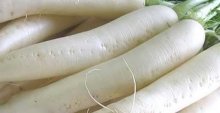
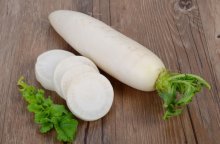
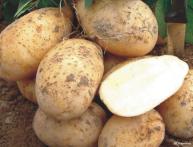
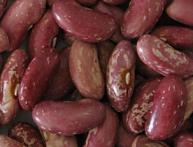
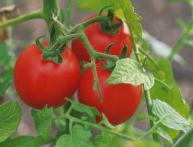
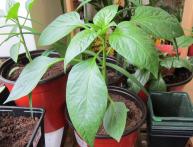
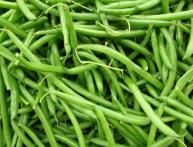
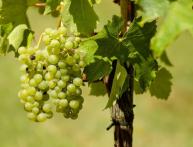
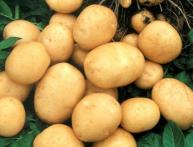
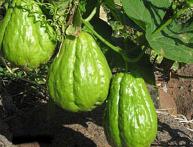
Comments
Last year we planted this root crop, and there were two varieties. One looks more like a carrot, and the other looks like an oblong beet. We planted vegetables in the summer. I didn’t know that daikon could be added to soups; we only ate it in salads. We kept the vegetable in the basement until March.